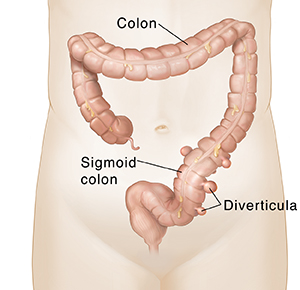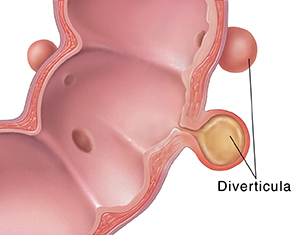The colon (large intestine) is the last part of the digestive tract. It absorbs water from stool and changes it from a liquid to a solid. In some people, small pouches called diverticula can form in the colon wall. This is called diverticulosis. It's very common as people get older. The pouches can become inflamed and infected. If this happens, it becomes a more severe problem called diverticulitis. These problems can be painful. But they may be managed with treatment.
Managing your condition
Your healthcare provider may prescribe diet changes or medicines. You might need surgery if your problem is severe.
Certain medicines can help soften and bulk up stool, which makes bowel movements easier. Available in pill, powder, and wafer form, examples of these medicines include:
-
Psyllium
-
Methylcellulose
-
Polycarbophil
If you have diverticulosis
Follow this treatment advice:
-
Make changes to your diet. This is often all that's needed to control symptoms. The main changes are adding fiber and drinking more water. Fiber absorbs water as it travels through your colon. This helps your stool stay soft and move smoothly. Water helps with this process.
-
If needed, you may be told to take over-the-counter stool softeners.
-
To help ease pain, take antispasmodic medicines as prescribed.
-
Watch for changes in your bowel movements. Tell your healthcare provider if you notice any changes.
-
Begin an exercise program. Ask your healthcare provider how to get started.
-
Get plenty of rest and sleep.
If you have diverticulitis
Treatment depends on how bad your symptoms are. They include:
-
For mild symptoms. You may be put on a liquid diet for a short time. Antibiotic medicine may be prescribed. If these two steps ease your symptoms, you may then be prescribed a high-fiber diet. If you still have symptoms, your healthcare provider will discuss more treatment options with you.
-
For severe symptoms. You may need to be in the hospital. There, you can be given IV (intravenous) antibiotics and fluids. You'll be put on a low-fiber or liquid diet. You may need surgery if severe symptoms aren't eased by medical treatment, or if the diverticula have burst (ruptured).
Keys to colon health
Help keep your colon healthy with these lifestyle tips:
-
Eat a healthy diet. Include plenty of high-fiber fruits, vegetables, and whole grains.
-
Drink plenty of liquids such as water and juice.
-
Keep a healthy lifestyle. Do regular exercise, manage your stress, and get enough rest and sleep.
Featured in



